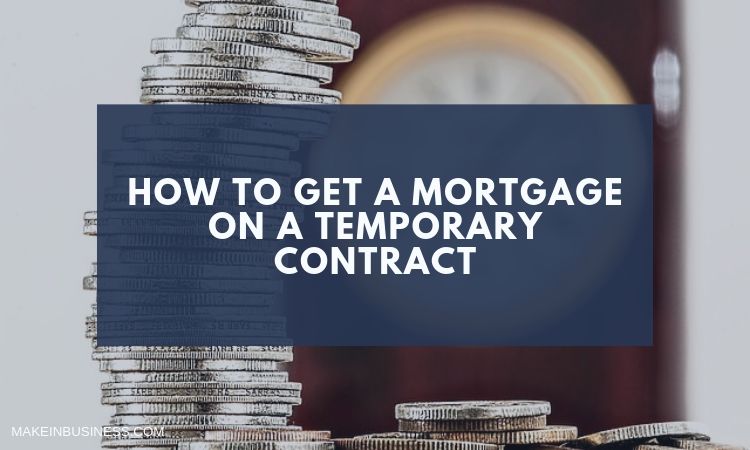Can I Get a Mortgage on a Temporary Contract?

One of the main things that mortgage providers look at when making a lending decision is affordability. While you might be able to afford your mortgage at the moment, will you also be able to afford it in the future? This is one of the main reasons that workers on temporary contracts struggle to secure a mortgage.
If you are currently on a temporary contract, you may be wondering if you will be able to get on the property ladder. The simple answer is that there is no simple answer. While some lenders will look past your employment status, others will view it as an obstacle.
Every lender is different, so it’s important to shop around before making any final decisions. Just because one lender has rejected your application, it doesn’t mean that all of them will. If you’re not sure, you can find out more about mortgages for agency workers and temporary contracts from Niche Mortgage Info.
Here are just some of the things a mortgage provider will consider as part of the application process.

Has your contract previously been renewed?
Even if you are on a temporary contract if you can show a past history of contract renewals you might be able to secure a mortgage with a specialist lender. They will want to see a past history of steady income and evidence that you haven’t had any career gaps in the past few years. If you can provide this evidence, you should be able to secure a mortgage just like anyone else.
How is your credit rating?
Your credit score is a huge factor in a mortgage application. This is because lenders look to your credit score as evidence of payment history. If you regularly make late credit card payments or you struggle to keep up with your phone bill, lenders might see this as a red flag.
On the other hand, if you have a strong credit history, don’t have any CCJs and you are using less than 50% of your overall credit limit, this can be a positive sign to lenders. They may be more willing to look past your employment status if you can show a history of responsible borrowing.
Could you use a guarantor?
A guarantor is another person (usually someone related to you) who agrees to step in and make your mortgage payments if you are unable to do so. They are not listed on your deed, but they do have to be part of the mortgage application process. If you are on a temporary contract or if you’re an agency worker, this can help to reassure lenders. Finding a guarantor to make your mortgage application with can be hugely beneficial.
Can you offer a bigger deposit?
Mortgage lenders are always concerned with risk. If they lend to you, what is the risk that you aren’t going to be able to pay them back on time? With this risk in mind, offering a bigger deposit can help to make lenders see you in a more positive light. If you are borrowing less money, there is less risk. If you are able to do so, you could consider supplementing your deposit with an unsecured personal loan. Bear in mind that this loan will also make up part of your affordability calculations, so only do this if your mortgage will still be affordable.
Getting a mortgage when you are an agency worker or on a temporary contract doesn’t have to be a headache. If you aren’t sure which lenders to approach and you don’t want to have rejected mortgage applications on your credit report, work with a specialist broker. A broker will have access to the entire mortgage lending market and will be able to advise on which lenders are more likely to accept your application.
FAQS
The starting point for most lenders is your current employment status and they generally find it difficult to offer a mortgage if you are currently in a temporary job role. You may be able to get a mortgage if there is evidence that the temporary job is likely to become permanent or if you are likely to be offered positions in the future.
It depends on the lender’s criteria and your employment history. Generally, lenders look at your most recent employment history and will prefer to see consistent income for the past 12 months.
Yes, mortgage lenders will assess your income from temporary contracts when assessing your application. They will look at your bank statements and proof of income from the previous contract to determine your ability to repay the loan.
Yes, there are risks associated with taking out a mortgage during a period of temporary employment. Lenders may find it difficult to assess your ability to repay the loan based upon your temporary contract income and may require additional security.
Additional security may include a guarantor or additional collateral, such as another property or personal possessions.
This depends on the lender’s criteria but typically they want to see at least three months of income from the same employer.
Generally, yes. Mortgage lenders prefer to see a history of consistent income and may find it harder to assess your repayment ability on a temporary contract.
Yes, there are specialist lenders who may offer mortgage products for those employed on a temporary contract.
Not necessarily. Depending on the lender, a mortgage with a temporary contract may have different repayment terms, interest rates or other features than a mortgage with a permanent contract.
If you are interested in taking out a mortgage with a temporary contract, it’s a good idea to speak to a financial advisor to discuss your options. You may also want to research the mortgage market to find lenders who may offer products suited to your needs.






